448 Search Results for autism
November 4, 2013
by Robin Parker -
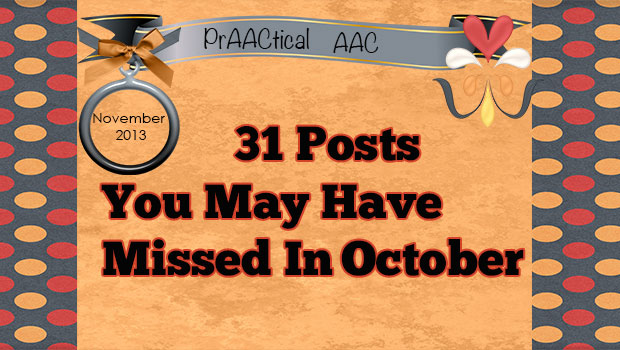
Strategy of the Month Building Participation Building Participation with Older Learners Classroom Participation Community Participation PrAACtical Thinking Second Annual AAC Awareness Month Celebration! 5 Fun AAC Things to do to Get Ready for Halloween 30 Posts You May Have Missed in September Celebrate AAC Awareness Month with PrAACtical Giveaways Another PrAACtical Celebration How Can we Make ‘Clients’ ‘like’ Using their AAC ? 6 Things to Learn from Talking AAC Communicative Competence in AAC Throwback Thursday Core Word Round Up Celebrating AAC Awareness Month 2013 Halloween Recipes for Cooking AAC Style Fast FAACt- What 24 Cents Will Buy Perception & Presuming Competence 5 Ways to Promote Consistent AAC Use What Went Well How I Do It Implementing AIded Language Input with Alicia Garcia 5 AAC Things I Wish I Had Known with Deanne Shoyer Teach Me Tuesdays Alexicom AAC Proloquo2Go Video of the Week Everyone Communicates- Advocacy & Inclusion Developing Communicative Competence... [Read More...]
October 26, 2013
by Robin Parker -
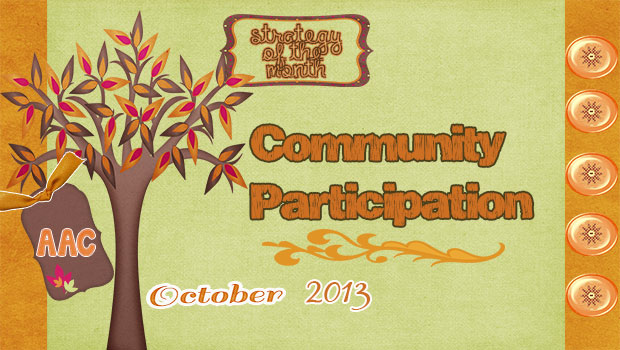
Community participation and communication for AAC users is an integral part of of developing, growing up, and having inclusive opportunities. We often relate community participation to quality of life indicators. Community participation for AAC users begins from the… beginning. Young children can order in restaurants, use picture menus, and have access to many inclusive events. As children grow into adolescents and adults, community participation involves post secondary options, employment, and community living. Perspectives from AAC Users Have communication displays and devices available at ALL times– You need access to a communication system(s) to participate in all situations. Remember to take AAC with you. The sooner the AAC user becomes responsible for taking or telling someone to take the device/displays with them the easier it becomes. For mobile technology systems, there are rugged cases that withstand wind, water, even medical waste (see Lauren Enders Pinterest boards for case and accessory options).... [Read More...]
October 15, 2013
by Robin Parker -
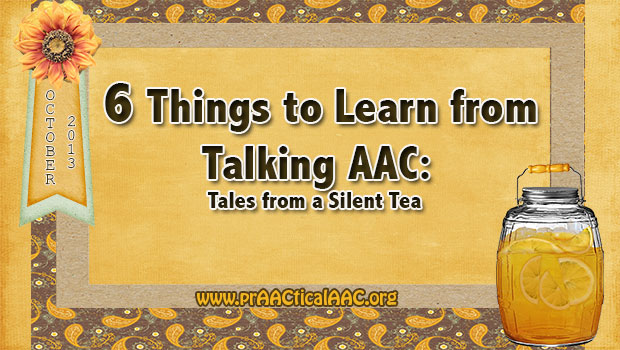
We participated in a silent tea. We used no tech, low tech, and high-tech AAC. For 1 hour. With a group of graduate students, families, and clients. We only communicated with AAC, no natural speech. It was enlightening to say the least. We have done silent teas before, but not recently and as it turns out, a lot was forgotten. Lessons Learned: Communication Takes Longer. Communication takes much longer when using a speech generating device. This is true even when you know the message you are trying to compose, even when you know where the symbols or words are located. We are pretty good at using pause time and waiting expectantly but realized we need to probably wait even longer for messages to be composed. As long as the interaction is continuing, waiting 45 seconds is not too long and if you see someone in... [Read More...]
October 4, 2013
by Robin Parker -
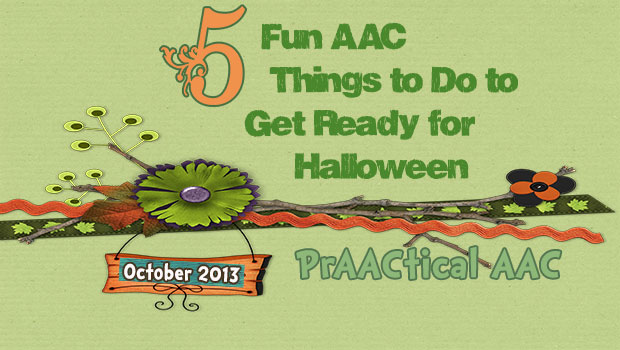
We love to start planning for holidays early. It helps facilitate conversation before, during, & after exciting activities and events. When we begin using core and fringe vocabulary early, frequently, and authentically the learner has the most opportunity for success. Use Schedules: Use a monthly calendar to have a Halloween countdown, Use mini-schedules to make food recipes, spooky science concoctions, or even to plan the trick or treating routes. Use a small talk app like Fat Cat Spooky Chat to prAACtice what you will SAY (October core words) on Halloween. Use a social narrative to prepare everyone for what to expect on and around Halloween. More Halloween social narratives can be found at Autism Community, One Place for Special Needs, Katherine Sanger You Tube, & Kentucky Autism Training Center Prepare a choice board of Halloween costume options and let the learner decide on the costume. PrAACtice a script to be... [Read More...]
September 28, 2013
by Robin Parker -
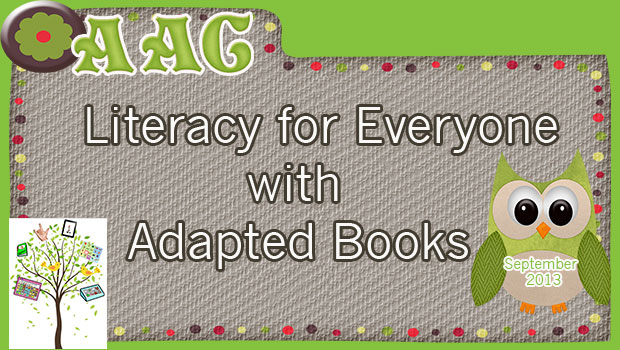
To integrate reading and writing into communication & language learning we need to have lots of books that are easily accessible. Books should be accessible physically as well as through content and interest. This holds true for ALL learners even those that don’t like books but do like…… wheels. We have made literacy accessible for a young girl who only liked elevators, and a boy who only liked balls, and a young adult who liked Barney books but not much else. It holds true for ALL disabilities, and ALL levels of reading and writing. For our final September Literacy Strategy of the Month, we wanted to share the abundance of resources for making adapted books. Because when we have great adapted books, literacy is more accessible. Check out these awesome resources for making your own adapted books and for printing out already created adapted books and lessons. We love early... [Read More...]
September 27, 2013
by Robin Parker -
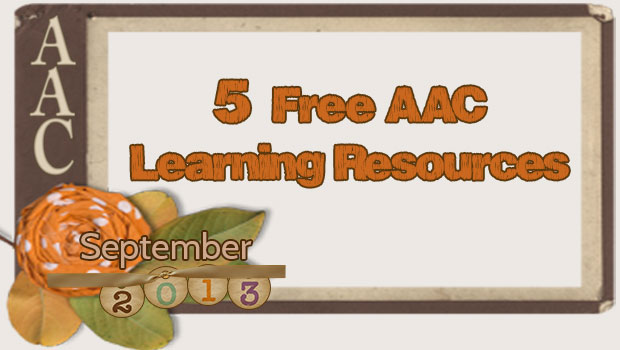
Learn with the Experts Anytime and Any Place Ablenet Professional Development– Ablenet provides free live and recorded webinars by experts in various areas of AAC. The topics range from helping add assistive technology (AT) into IEP’s, to Apps & AAC, to literacy, and much much more. Special Education Technology British Columbia Learning Centre– A variety of recorded webinars on a wide range of AAC topics. The RERC on Communication Enhancement– A variety of recorded webinars about a variety of AAC topics. Augmentative and Alternative Communication Webinar- Autism Speaks– This webinar was recorded in 2012 but focuses on AAC & Autism. Working Without Words: AAC & Technology in the Workplace by Florida Center for Inclusive Communities– Provides an overview of AAC and its applicability in the workforce. Strategies for supporting AAC users and people using AAC in the workplace will be highlighted. Florida Center for Inclusive Communities also offers a variety of... [Read More...]
September 26, 2013
by Robin Parker -
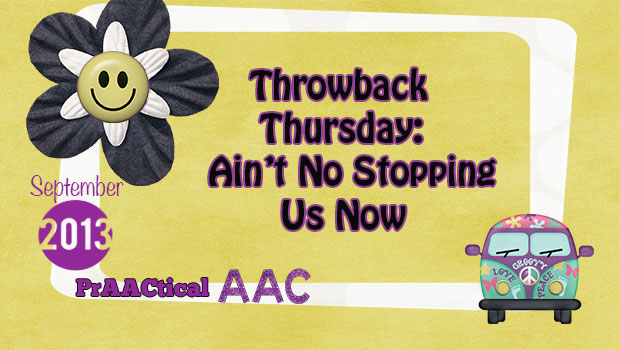
(updated/original version published on October 20, 2012) Sometimes saying ‘no’ to the demands of the day actually helps us rejuvenate and allows us to be more productive. Saying ‘no to false information helps us to advocate for ourselves. The ‘no’ topic seems to be trending now. There have been quite a few blog posts and comments about the issue (Just Say No, How and When to Give Your Students A Break). We are so glad that this topic is getting more focus. Of course everyone agrees that ALL people have the right to say ‘no’. But it is not always so simple. There are many types of ‘no’. There is the outright ‘no’, the ‘no’ to more work, the ‘no’ for disagreement, the ultra important ‘NO’ to unwanted touching, and many more. And depending upon how you say ‘no’ is the difference between it being accepted or… NOT. The issue... [Read More...]
September 25, 2013
by Carole Zangari -
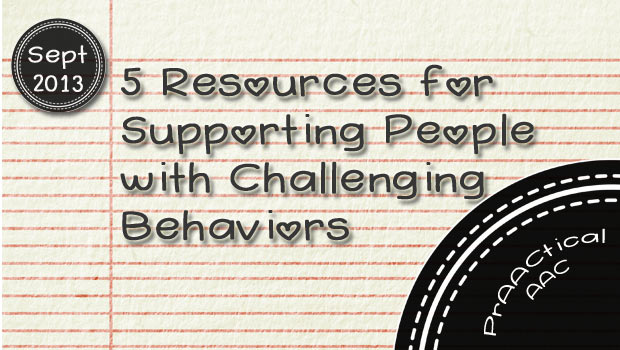
Need some help or new ideas for working with people who have challenging behaviors? Here are some resources to explore. 1. The Challenging Behavior Foundation is a UK-based organization with many good resources. You can check the archives of their newsletters here. 2. Wonderful instructional module on Functional Communication Teaching on the Autism Training Modules website. It takes time to work through this, but the information makes it worth the trouble. You may have to register (free) the first time you visit the site. 3.The National Professional Development Center on ASD has great information on Functional Communication Teaching, an approach with a strong evidence base. 4. The Functional Behavior Assessment Worksheet by PaTTAN 5. Our Pinterest board on Positive Behavior Support
September 17, 2013
by Robin Parker -
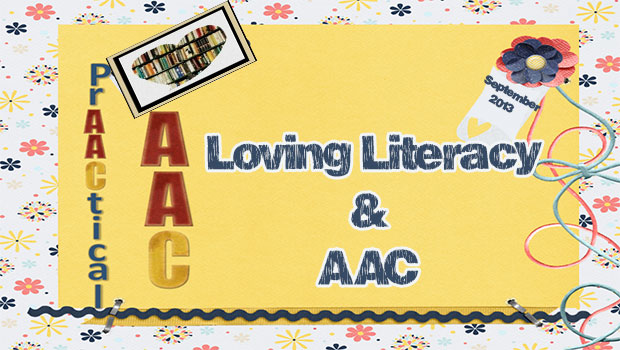
It’s International Literacy Month. We want to take this opportunity to remember that EVERYONE should have direct literacy instruction. Some students will be starting by learning to enjoy books while others will be readers already. Either way, there should be a literacy plan with short term and long term goals. If you need ideas for beginning or just expanding reading skills, here are some seriously excellent literacy resources for AAC. Take a look, enjoy and please let us know your favorite literacy resources so we can add them to this list. TalkSense- 101 ideas for literacy and AAC. Also, provides access to many picture symbols and litSymbols Jane Farrall’s Blog: Literacy, AAC, & Assistive Technology– Literacy resources specific to AAC and assistive technology Tar Heel Reader – books for beginning readers of all ages. Bookshare- accessible books and journals for readers with print disabilities Center for Literacy and Disabilities Studies–... [Read More...]
September 16, 2013
by Carole Zangari -
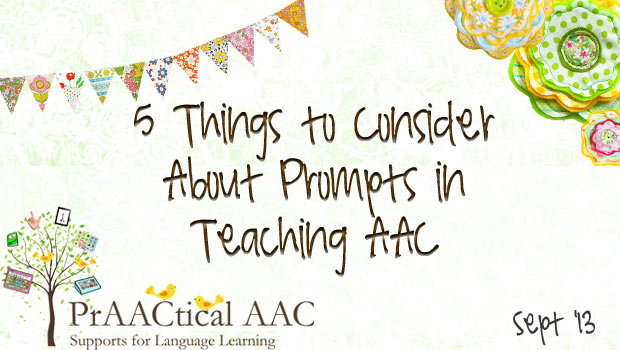
When you’re learning something new, it’s likely that you’ll need some help along the way. The same is true for our AAC learners. Here are some of the things we’ve been thinking about lately regarding prompts and cues. 1. Sometimes, actually MANY times, a ‘perfect pause’ is all that’s needed. Stop the action, look expectantly at the learner, and wait quietly. How long? It depends on the individual and the situation, but 10 or 15 seconds is in the ballpark for most AAC learners. 2. It’s important to consider both the type of prompt (e,g., gestural, verbal, physical) and how much information that prompt provides to the learner. We hear lots of SLPs say that they prefer verbal prompts because they are less helpful than, say a physical prompt, and, thus, require more from learner. Not always. Here’s an example: “Jason, tell me, ‘More milk.’” Vs. Gesturing over the message... [Read More...]









